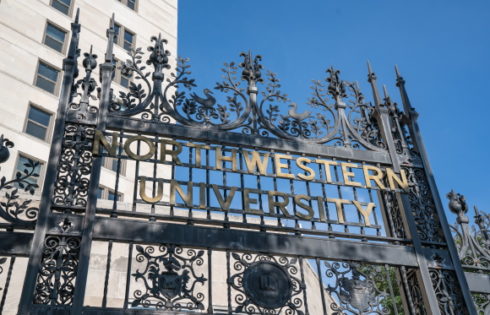
School set to host Democratic primary debate
A small New Hampshire Catholic college is in the throes of a legal dispute between the Benedictine monks who have run the school since its founding in 1889 and their own board of trustees.
The timing is particularly bad for St. Anselm College: It was chosen Thursday to host a Democratic primary debate in February.
The lawsuit by the monks, filed in November, seeks no monetary damages. Its only aim is to resolve a question on the interpretation of a state law that requires mission and school bylaw amendment power be vested in the board of trustees.
The monks insist that power must remain with them – otherwise the school could risk becoming secularized.
The board says that if the “statutorily required” amending power is not with them, the school risks losing accreditation. However, the monks say the law doesn’t apply to St. Anselm because of the college’s religious affiliation, and even if it did, the charter keeps the amending power with the monastery.
The legislative charter, written in 1889 by the founding monks and approved by the New Hampshire Legislature in the same year, gave the monks the power to “make such bylaws for the government of said corporation, and the admission and expulsion of members and associates thereof,” according to the suit. Amending the bylaws requires a two-thirds majority of the monks.
Weeks after the lawsuit was filed, ABC selected the New Hampshire liberal arts college to host a Democratic debate on Feb. 11, ahead of the New Hampshire primary. The school has previously hosted primary debates for both parties in presidential election cycles dating back to 1984.
MORE: Students at Catholic college rally for Planned Parenthood
BREAKING NEWS: We are excited to announce that we will host New Hampshire’s only Democratic Presidential Primary Debate on Feb. 7, 2020 in partnership with @ABC @WMUR9 and @AppleNews
Read the story: https://t.co/8vruGC8cQ0#FITN #NHPolitics pic.twitter.com/Of3zTp8Lgw
— Saint Anselm College (@SaintAnselm) December 12, 2019
Must recruit ‘trustees who fully support the mission of faithful Catholic education’
The board of trustees is made up of 40 members, of which seven are Benedictine monks. The board was established in 2009 to comply with the accrediting agency’s requirements, but the monks maintained the power to amend the college bylaws and an additional power called the “reserve power.”
The reserve power is the power to control the overall mission of a Catholic college that is run by a religious order. It allows the religious order to maintain authority over the Catholic identity of the institution so as not to deviate from church teaching.
A Catholic education watchdog told The College Fix in an email that the situation could serve as a lesson in selecting faithful trustees.
The “whole debacle at St. Anselm College is reminder of how critically important it is for Catholic colleges to recruit trustees who fully support the mission of faithful Catholic education,” said Patrick Reilly of the Cardinal Newman Society, an organization that monitors the faithfulness of Catholic education nationwide.
“Administrators think they are in control, but a distant board of trustees can do enormous damage,” Reilly told The Fix in an email. “The board is especially important in a leadership transition. A college can change dramatically when its board chooses a president who charts a radically different course, or if the president lacks commitment to Catholic fidelity and formation.”
In a phone interview with The Fix, Abbott Mark Cooper iterated that the sole purpose of the lawsuit is to allow the monks to continue to hold the amending power over the bylaws of the college, not to seek financial damages.
MORE: Diocese shrugs as Catholic college gives ‘chest binders’ to female students
‘The members would be violating their own fiduciary duties to the college’
The suit says that the monks amended the bylaws in 2009 in order to establish a board of trustees, which capped non-monk members’ terms at three terms of three years each. The monks made changes to the bylaws in 2015, 2017, and in May 2019 at the request of the board.
But the trustees’ attempt to assert control over the bylaws included an attempt to change the bylaws on the term limits of members. The suit says that several members joined the board in 2011 and therefore faced a term limit in 2020 that prevented them from remaining on the board.
“In August of 2019, the leadership of the board of trustees proposed further changes to the by-laws including limiting the monk member’s power to determine what constitutes the college’s Catholic and Benedictine mission and identity, limiting the monk members’ power to approve changes to the bylaws, extending the terms of the leadership of the board of trustees,” the suit says.
The suit says that as of May 2019, the board of trustees that “no bylaw amendments could be adopted without the consent of the [monks].”
The board recommended a series of amendments to the monks in August 2019, including the attempt to extend the term limits of board members. But these changes were rejected.
MORE: Catholic college summons student after he criticizes its drag show
The suit cites a letter sent that month by the monks to the board that said that the proposed amendments “carry an unreasonable risk of the secularization of St. Anselm College.”
“St. Anselm College is a Catholic institution and the members have certain powers in order to guarantee fulfillment of their ecclesiastical responsibility to educate consistent with the Catholic faith,” the citation reads. “The members would be violating their own fiduciary duties to the college to allow it to be secularized.”
After the letter was sent following the rejection of the bylaw amendments, the board claimed that state law required them to control the power to amend the bylaws, prompting the dispute.
The board then amended the bylaws without the approval of the monks on Oct. 18, but nine days later the monks voted to repeal the amendments. They instead adopted “restated and revised bylaws that incorporated changes agreed upon by both the trustees and the members but did not change the amending power as asserted by the trustees and opposed by the members.”
The monks of St. Anselm are requesting that the court determine that the state law in question does not retroactively apply to them, and even if it were applicable the legislative charter would maintain amending power with the religious order.
No financial damages are being sought.
‘Personal attacks on the motives of the Trustees’
The chair of the board of trustees, Ann Catino, published a lengthy statement in response to the lawsuit. She insisted that the reaccreditation process with the New England Council of Higher Education requires the college to make the changes to the governing structure and bylaws sought by the board, and declares that the board would “vigorously defend this litigation on behalf of the College.”
“The challenge of conforming to those standards stretches back more than two decades but has become increasingly acute during this phase of reaccreditation,” Catino said.
Catino alleged that during accreditation review in 1999, the accrediting agency “required that an appropriate governance structure be developed and defined,” a requirement that was only followed 10 years later “on the eve of the next accreditation visit.”
The aim of the bylaw changes, Catino said, was to fully move St. Anselm College into compliance with the accrediting agency and that some resistance from the monks was expected.
“Rather than embracing and collaboratively navigating our future together to preserve the College’s identity in a way that achieves today’s standards, Abbot Mark on behalf of the Members has filed a lawsuit elevating our internal disagreements to the court of law and a court of public opinion. In so doing, he accuses the Trustees of secularizing the College and the discussion has devolved to personal attacks on the motives of the Trustees,” Catino said.
Catino went on to say that “considerable misinformation is being spread regarding proposals offered (or not offered) for consideration.” She did not elaborate in the lettter what that misinformation was, and The Fix could not find a way to reach her.
The Cardinal Newman Society publishes a list of Catholic colleges it recommends based on several factors related to the institution’s fealty to the teachings of the Catholic church. It does not currently include St. Anselm College on that list.
MORE: Respected Benedictine monk warns that society is losing its ability to listen
MORE: Is this Catholic college a ‘totalitarian diversity cult’?
IMAGE: Africa Studio/Shutterstock
Like The College Fix on Facebook / Follow us on Twitter





Please join the conversation about our stories on Facebook, Twitter, Instagram, Reddit, MeWe, Rumble, Gab, Minds and Gettr.